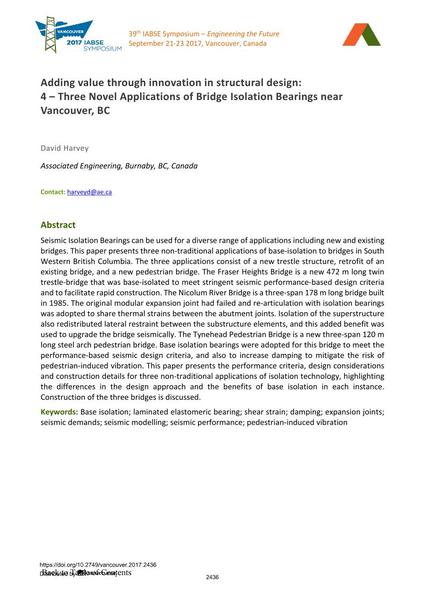Adding value through innovation in structural design:

|
|
|||||||||||
Bibliographic Details
| Author(s): |
David Harvey
(Associated Engineering, Burnaby, BC, Canada)
|
||||
|---|---|---|---|---|---|
| Medium: | conference paper | ||||
| Language(s): | English | ||||
| Conference: | IABSE Symposium: Engineering the Future, Vancouver, Canada, 21-23 September 2017 | ||||
| Published in: | IABSE Symposium Vancouver 2017 | ||||
|
|||||
| Page(s): | 2436-2443 | ||||
| Total no. of pages: | 8 | ||||
| Year: | 2017 | ||||
| DOI: | 10.2749/vancouver.2017.2436 | ||||
| Abstract: |
Seismic Isolation Bearings can be used for a diverse range of applications including new and existing bridges. This paper presents three non-traditional applications of base-isolation to bridges in South Western British Columbia. The three applications consist of a new trestle structure, retrofit of an existing bridge, and a new pedestrian bridge. The Fraser Heights Bridge is a new 472 m long twin trestle-bridge that was base-isolated to meet stringent seismic performance-based design criteria and to facilitate rapid construction. The Nicolum River Bridge is a three-span 178 m long bridge built in 1985. The original modular expansion joint had failed and re-articulation with isolation bearings was adopted to share thermal strains between the abutment joints. Isolation of the superstructure also redistributed lateral restraint between the substructure elements, and this added benefit was used to upgrade the bridge seismically. The Tynehead Pedestrian Bridge is a new three-span 120 m long steel arch pedestrian bridge. Base isolation bearings were adopted for this bridge to meet the performance-based seismic design criteria, and also to increase damping to mitigate the risk of pedestrian-induced vibration. This paper presents the performance criteria, design considerations and construction details for three non-traditional applications of isolation technology, highlighting the differences in the design approach and the benefits of base isolation in each instance. Construction of the three bridges is discussed. |
||||
| Keywords: |
seismic performance damping base isolation pedestrian-induced vibration expansion joints laminated elastomeric bearing shear strain seismic demands seismic modelling
|
||||
